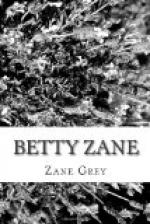After this the besiegers withdrew for a breathing spell. At this early stage of the siege the Indians were seen to board Sullivan’s pirogue, and it was soon discovered they were carrying the cannon balls from the boat to the top of the bluff. In their simple minds they had conceived a happy thought. They procured a white-oak log probably a foot in diameter, split it through the middle and hollowed out the inside with their tomahawks. Then with iron chains and bars, which they took from Reihart’s blacksmith shop, they bound and securely fastened the sides together. They dragged the improvised cannon nearer to the Fort, placed it on two logs and weighted it down with stones. A heavy charge of powder and ball was then rammed into the wooden gun. The soldiers, though much interested in the manoeuvre, moved back to a safe distance, while many of the Indians crowded round the new weapon. The torch was applied; there was a red flash—boom! The hillside was shaken by the tremendous explosion, and when the smoke lifted from the scene the naked forms of the Indians could be seen writhing in agony on the ground. Not a vestige of the wooden gun remained. The iron chains had proved terrible death-dealing missiles to the Indians near the gun. The Indians now took to their natural methods of warfare. They hid in the long grass, in the deserted cabins, behind the trees and up in the branches. Not an Indian was visible, but the rain of bullets pattered steadily against the block-house. Every bush and every tree spouted little puffs of white smoke, and the leaden messengers of Death whistled through the air.
After another unsuccessful effort to destroy a section of the stockade-fence the soldiers had retired. Their red jackets made them a conspicuous mark for the sharp-eyed settlers. Capt. Pratt had been shot through the thigh. He suffered great pain, and was deeply chagrined by the surprising and formidable defense of the garrison which he had been led to believe would fall an easy prey to the King’s soldiers. He had lost one-third of his men. Those who were left refused to run straight in the face of certain death. They had not been drilled to fight an unseen enemy. Capt. Pratt was compelled to order a retreat to the river bluff, where he conferred with Girty.
Inside the block-house was great activity, but no confusion. That little band of fighters might have been drilled for a king’s bodyguard. Kneeling before each porthole on the river side of the Fort was a man who would fight while there was breath left in him. He did not discharge his weapon aimlessly as the Indians did, but waited until he saw the outline of an Indian form, or a red coat, or a puff of white smoke; then he would thrust the rifle-barrel forward, take a quick aim and fire. By the side of every man stood a heroic woman whose face was blanched, but who spoke never a word as she put the muzzle of the hot rifle into a bucket of water, cooled the barrel, wiped it dry and passed it back to the man beside her.




